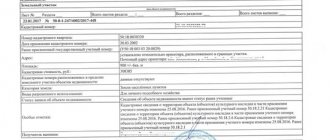When carrying out legally significant actions in relation to real estate, buyers who want to be confident in the security of the transaction are interested in the question of who can receive an extract from the Unified State Register of Real Estate (USRE) and other documents for an apartment, house, or other housing. The Real Estate Register (abbreviated as EGRN) is a unified database of all registered property, systematized into sections. State registration of property rights serves as the only legal evidence of the ownership of property by one or another owner.
In addition to information about the right holders, the register allows you to clarify the grounds for obtaining the right by the owner, transactions carried out in relation to real estate, the presence/absence of encumbrances in the right of disposal, a description of the characteristics of the property, including area, cost according to cadastral registration, cadastral number.
When registering the transfer of rights to a new owner, an extract from the Unified State Register of Real Estate (USRE) is required.
General information about the statement
An extract from the Unified State Register of looks like a document containing information about the copyright holder of real estate objects, as well as the characteristics of such objects.
As of January 2020, changes to the name of the organization came into force.
Currently, the Unified Legal Register (USRE) is combined with the Real Estate Cadastre (GKN), and certificates of rights are provided from the Unified State Register of Real Estate .
There are two types of statements:
- standard,
- extended.
The standard type includes only basic information about the owner and the object owned by him - the address of the apartment, house or plot of land, the owner’s full name and the date of ownership.
The extended version contains significantly more data:
- cadastral number,
- Full names of all previous copyright holders,
- dates of transfer of ownership rights,
- specifications,
- Address of the object,
- information about the legal capacity of the copyright holder,
- information about encumbrances.
The set of information in the extended version of the document may vary depending on the property (apartment, plot of land or house).
For example, for a land plot , the type of permitted land use, intended purpose, area and category of land, as well as the coordinates of the boundaries and information about territorial disputes with neighbors are indicated.
For apartments and residential buildings, extended statement indicates the number of floors or tiers, living area and the number of internal rooms and premises.
In some cases, the material of construction and the date of commissioning of housing may be indicated.
Information about encumbrances may contain information about the seizure of real estate, the rights of third parties , or the presence of legal disputes about the ownership of the property in the past.
Can they evict for debts on rent and housing and communal services? Read our article.
A lease or easement agreement, officially registered, can also be considered an encumbrance , since when the legal owner changes, the tenant retains his rights to reside in the living space, as well as to use the land plot.
An extract is required in the following cases:
- to prove ownership,
- to confirm the absence of encumbrances,
- to receive various services in the land and town planning committee,
- as evidence of need.
A standard extract indicating the copyright holder is needed when selling an object for presentation to a future buyer, as well as to credit organizations to reduce interest rates on the loan.
prove the fact of need by ordering an extract of all real estate properties owned by members of the same family, indicating the living space.
If the area per person is less than the standard adopted in a given region, then those presenting the extract can count on benefits and subsidies .
An example of an extract from the Unified State Register of Real Estate, issued in 2020.
What information is included in the statement?
The data stored in the registry is publicly available, except for information that is in restricted access. An extract about a real estate property includes the following information:
- Detailed description of the object (cadastral number, date of its assignment, address, area, number of floors of the building, name of the object, etc.).
- Information about the person or persons who have the right to this object (full name only).
- Type of right (sole or shared ownership).
- Information about existing encumbrances and restrictions.
- The document that formed the basis for the emergence of the right to property.
- Change or termination of rights, as well as transfer of rights to another person.
- Requirements for this immovable property stated in court.
- Transactions that took place on this object.
- Date of registration of this right.
An extract from the Unified State Register under an equity participation agreement is not issued today. The law has introduced a completely new type of extract on registered child-care facilities, which is issued to the site where the construction of the facility is being carried out. The uniform form of the document was approved by Order No. 975 of the Ministry of Economic Development of Russia. The document form must contain the following information:
- characteristics of the site (cadastral number, address, area, what category of land it belongs to);
- information about the copyright holder and information about the registration of the right;
- existing restrictions and encumbrances (type, number, date of registration, period for which they are established);
- information about equity participation agreements (date and registration number, description of the residential property, data of shareholders, information about existing restrictions, information about insurance or surety agreement);
- information about the rights of claim declared for the plot in court, objections to the registered right, the decision to seize the plot;
- information about the lack of the right of the construction company to collect funds for the construction of the facility.
- information about the recipient of this document.
Extracts from the Unified State Register for the DDU agreement can be found here.
Changes in 2020
Since 2020, a certificate from the Unified State Register of Real Estate has also begun to act as a title document , replacing the abolished certificates of ownership.
Now an extract must be ordered for all cases where it is necessary to confirm the fact of ownership of real estate and the legality of such ownership.
Read about the cancellation of the certificate of state registration of property rights here.
The following information has been updated:
- about the existence of the fact of ownership,
- on the basis for the emergence of the right (purchase agreement, inheritance, receipt from the state, etc.).
In addition, obtaining an extract has become available in all multifunctional centers , regardless of the place of permanent registration of the citizen.
The concept of civil capacity and legal capacity of individuals
Verifying a citizen’s legal capacity is a rather sensitive issue, since it is impossible to obtain a 100% guarantee. But you still need to check. How to do it?
Every citizen has civil rights throughout his life; in addition, he is endowed with certain civil responsibilities, which he cannot refuse. Such possession is for life. That is, the period is not limited, but it is not combined with subjective right, but only represents the prerequisites for possessing various civil rights (ownership of a land plot, car, apartment and other objects).
- Legal ability or civil capacity to bear responsibility and have obligations, to act as a subject of law in accordance with Article 17 of the Civil Code. For the seller in this case, it is implied that he has the legal right to own, use and dispose of any housing (for example, an apartment).
- Legal capacity. This is a person’s understanding of the meaning of his own actions, their sequence, as well as the ability to perform actions in accordance with legal capacity.
Where to get it?
You can independently order an extended or standard document from the following sources:
- branches of Rosreestr ,
- MFC,
- Internet portal of State Services ,
- Rosreestr website .
- by mail .
Obtaining a certificate from the MFC and the Rosreestr occurs in the same way - you need to go to the free window with your passport, write an application for a certificate and, if necessary, pay a state fee .
If the certificate needs to be delivered to another city, this is indicated in the application.
Through State Services or the Rosreestr , a certificate is ordered by filling out an online frame on the website.
The dialog box indicates the type of certificate and the method of obtaining it (electronically, by mail or at MFC branches).
To enter the Rosreestr use the login and password that were received when registering on the State Services .
After this, you will be able to order an extract absolutely free of charge .
To obtain an extended extract , verification is required on the portal; it can be completed after registration at any civil registry office by applying with a passport. Verification is free .
It is important to know that at the post office you can only receive a ready-made document , pre-ordered via the Internet or at an out-of-town department of the MFC.
For detailed instructions on obtaining an extract from the Unified State Register of Real Estate via the Rosreestr website, watch the video:
What is a certificate of legal capacity?
In general, there is no certificate of legal capacity in practice. There are such certificates:
- that the person is not registered at a psychoneurological dispensary (PND);
- that the person is not registered at a drug treatment clinic.
A certificate from the IDP is issued at the person’s place of residence. It indicates that he suffers or does not suffer from any psychoneurological diseases.
This document provides the following information:
- name of the document (certificate or certificate) about the person’s health status;
- information about the citizen who applied for the certificate - his full name, year of birth;
- full name of the medical institution, surname and initials of the doctor who issued the certificate;
- the result of the medical examination, the date of its conduct;
- doctor's signature and stamp;
- seal of the medical institution.
If there is any doubt that a person suffers from alcohol or drug addiction, then he needs to go to a drug treatment clinic, undergo the necessary examinations and obtain a certificate. It must reflect the same information as in the IPA certificate.
Documentation
To receive a standard or extended statement an individual will need:
- passport (for copyright holders),
- application for an extract,
- receipt of payment of state duty,
- notarized power of attorney (for representatives),
- permission to receive an extract from the owner (for third parties).
The application indicates the purpose of obtaining the extract and the list of data that must be reflected in the document.
Outsiders can only order a standard extract ; to obtain an extended extract, you need written permission from the copyright holder , certified by a notary office.
It is important to take into account that the owner of a property can track in his personal account of the State Services which persons and when received a standard extract with information about his property.
Legal entities will need additional paperwork to receive statements:
- certificate from the Unified State Register of Legal Entities,
- TIN,
- constituent documents,
- power of attorney issued by the management of the company.
In some cases, a power of attorney from the counterparty , as well as excerpts from agreements on joint activities at the facility for which the extract is being ordered.
How much does an extract from the Unified State Register cost?
The specific cost of the certificate will depend on who submits the application: an individual or a legal entity. For the former, the amount of state duty is set at a lower level. In addition, the price and nature of the information requested will be affected. So, there is open access data that anyone can get. And there is information that belongs to the restricted access category. Only the owner of the property or certain government agencies can take possession of them. Well, as already noted, an electronic statement will cost applicants less than its paper version.
Statement
The application submitted to the offices of the MFC or Rosreestr to obtain an extract contains a request to provide information about the property .
As well as the current rights to it based on ownership of this object or permission from the owner.
The following information must be provided in the text:
- Full name and passport details of the person applying,
- residential address,
- the purpose of obtaining a certificate,
- a list of information that should be displayed in the document,
- method of providing the document.
Sample application for extract from the Unified State Register of Real Estate.
When submitting an application, employees of the MFC or Rosreestr can tell you exactly what information needs to be requested in the extended statement , depending on the purpose of obtaining it.
For example, if an extract is ordered for presentation to a future buyer of a living space or house, the document must contain information not only about the current and previous copyright holder , but also about possible encumbrances .
Read the article about what scams exist when selling real estate and how to avoid being deceived.
In what cases can an extract be refused?
This can happen for several reasons:
- if the information required by the applicant relates to information with limited access, or it is not subject to disclosure by law;
- if the application contains corrections, erasures or typos that distort its meaning and do not allow it to be correctly interpreted;
- if the method for obtaining the extract is not specified;
- lack of signature of the person submitting the application;
- The applicant's details are not provided.
If the unified register does not contain data on the requested real estate, or for other reasons they cannot be provided to the applicant, within three business days after sending the request, the registering authority is obliged to send a notification explaining the reasons why this document cannot be issued.
An extract from the Unified State Register of Real Estate on concluded DDU agreements is a very important document for the shareholder, since it contains all the reliable information about the object under construction, where he has invested his funds. The document allows you to find out whether the contract has passed the required registration, how the developer’s liability is insured, whether there are other applicants for the site on which the object is being built, whether the construction company has the right to attract funds from citizens. Thus, in order to protect yourself from problems, to ensure the reliability of the developer company and the validity of its rights, it is necessary, after concluding and registering the DDU, to order an extract from the register.
The Society for the Protection of Shareholders' Rights will help you with this, as well as provide you with any other assistance in matters of shared construction. The coordinates of our organization are posted in the “Contacts” section. You can also leave your request on this page.
Cost and terms
The cost of obtaining a document depends on the type of applicant, the type of extract and the method of its provision (paper or electronic).
Prices were approved by Order of the Ministry of Economic Development No. 291 dated May 10, 2016.
When receiving by mail in another city, the price of the service increases by the cost of overhead transportation costs.
It is important to note that receipt of a standard extract by the copyright holder - an individual - is a free service in all MFCs.
The period for providing the document is usually 3-5 working days , depending on the workload of the providing organization.
Receiving an extract through the MFC usually takes 1-2 days longer than through the Rosreestr department.
This time is necessary to forward documents to Rosreestr.
In a number of MFCs, you can request expedited issuance of a document on the day of application for an additional fee, the amount of which is usually 400-1200 rubles, depending on the region of application and the type of extract.
Other Practical Verification Methods
If the seller does not provide a certificate confirming his legal capacity to sell an apartment, his reliability and sanity can be checked in other ways:
Time of action
The validity of any type of statement is limited to the date of change in the information specified in it.
As soon as the parameters of the property or the copyright holder have changed, the extract becomes invalid .
If the data has not been changed, then the extract has no validity period, but it is important to take into account that the information provided is reliable only as of the date the document was issued .
For submission to government agencies, an extract is usually required, received no later than a month ago , and for presentation to individuals, the period is determined by agreement of the parties.
For example, real estate buyers usually require a statement received 1-2 weeks ago .
When is it recommended to request a certificate of legal capacity of a person?
In general, providing such a certificate is not a prerequisite for drawing up a contract..
If the buyer asks the seller for a certificate of his legal capacity in order, for example, to complete a purchase and sale transaction, he may refuse. In this case, all risks associated with possible human inadequacy are transferred to the buyer. He has the right to refuse to conclude a transaction or to sign an agreement at his own risk.
We strongly recommend requesting a certificate of legal capacity in the following cases:
- if the seller of the property is an elderly person . Often, older people do not understand or are not fully aware of their actions. Therefore, before concluding an agreement with an elderly person, you must ask him to obtain such a certificate from the dispensary;
- if doubts creep in regarding the sanity and adequacy of the second party to the agreement . If it seems to you that the person with whom you want to conclude an agreement is somehow not behaving correctly, he is experiencing inhibition of consciousness, an unnatural reaction to natural things, then you can ask him to present a certificate from the IPA;
- if a person has suspicions that the second party to the agreement suffers or has suffered from alcohol or drug addiction.
Legislative regulation
The following list of laws can serve as an auxiliary basis for clarifying the legal subtleties in the issue of obtaining a certificate of legal capacity:
Article 29. Recognition of a citizen as incapacitated by the Civil Code of the Russian Federation:
- The interrelated provisions of paragraphs 1 and 2 of Article 29, paragraph 2 of Article 31 and Article 32 of the Civil Code of the Russian Federation by Resolution of the Constitutional Court of the Russian Federation dated June 27, 2012 N 15-P (aimed at protecting the rights and legitimate interests of citizens who, due to a mental disorder, cannot understand the meaning of their actions or manage them, as well as to ensure the rights and freedoms of other persons and the protection of other constitutionally significant values that do not comply with the Constitution of the Russian Federation)
- Art. 29, paragraph 3, art. 30 of the Civil Code of the Russian Federation. In accordance with the provisions of Chapter 31 of the Civil Procedure Code, the court, when preparing a case for consideration, resolves the issue of ordering a forensic psychiatric examination.
Article 30. Limitation of the legal capacity of a citizen of the Civil Code of the Russian Federation:
- A citizen who, due to addiction to gambling, alcohol or drug abuse, puts his family in a difficult financial situation, may be limited by the court in legal capacity in the manner established by civil procedural legislation, and guardianship is established.
- The trustee receives and spends the earnings, pension and other income of a citizen whose legal capacity is limited by the court, in the interests of the ward in the manner prescribed by Article 37 of the Civil Code of the Russian Federation.
- A citizen over whom guardianship is established makes transactions, with the exception of transactions provided for in subparagraphs 1 and 4 of paragraph 2 of Article 26 of the Civil Code of the Russian Federation, with the written consent of the trustee.
- Such a citizen has the right to carry out transactions provided for by subparagraphs 1 and 4 of paragraph 2 of Article 26 of the Civil Code of the Russian Federation independently.
- A citizen may dispose of alimony, social pension, compensation for harm to health and in connection with the death of a breadwinner and other payments provided for his maintenance with the written consent of the trustee, with the exception of payments that are specified in subparagraph 1 of paragraph 2 of Article 26 of the Civil Code of the Russian Federation and by which he has the right to make his own decisions.
- If there are sufficient grounds, the court, at the request of the trustee or the guardianship and trusteeship body, may limit or deprive such a citizen of the right to independently dispose of his income specified in subparagraph 1 of paragraph 2 of Article 26 of the Civil Code of the Russian Federation.
- A citizen whose legal capacity is limited due to a mental disorder shall independently bear property liability for transactions made by him in accordance with this article. For the harm caused by him, such a citizen is liable in accordance with this Code.
- Clause 3: If the grounds on which the citizen was limited in legal capacity no longer exist, the court cancels the restriction of his legal capacity. Based on a court decision, the guardianship established over the citizen is cancelled. If the mental state of a citizen who, due to a mental disorder, was limited in legal capacity in accordance with paragraph 2 of this article, changes, the court recognizes him as incompetent in accordance with Article 29 of the Civil Code of the Russian Federation or cancels the restriction of his legal capacity. Legal capacity does not affect the very possibility of being an heir, but it is important when resolving issues related to inheritance (paragraph 3, paragraph 1, article 1153 of the Civil Code of the Russian Federation, paragraph 4, article 1157 of the Civil Code of the Russian Federation). To accept an inheritance, the guardian does not require a power of attorney (paragraph 3, clause 1, article 1153 of the Civil Code of the Russian Federation, article 32 of the Civil Code of the Russian Federation).
Decree of November 19, 2016 N 1221 On amendments to the Government of the Russian Federation Decree of November 17, 2010 N 927 “On certain issues of guardianship and trusteeship in relation to adult incompetent or partially incompetent citizens” on the Act on the inspection of the living conditions of a close relative.
When concluding any transaction, be it the sale or exchange of an apartment, a transaction aimed at obtaining benefits free of charge, the parties must be legally capable persons. This means that a person must understand his actions and be aware of their consequences.
In some cases, when concluding a transaction, a notary may require a certificate of legal capacity of the party to the transaction. Such a certificate can serve as evidence that the person who participated in the transaction at the time of its preparation was a sane, capable person.





